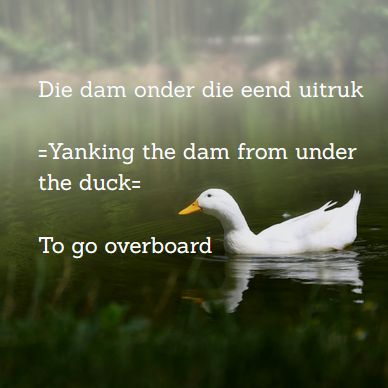Seen sometimes as barriers, languages are the tools we use to communicate and understand each other or the information at hand, such as this poem we can read in both English and Afrikaans.
MY STORIES BEGIN AS LETTERS
My pen is my wonderland.
Word water in my hand.
In my pen is wonder ink.
Stories sing. Stories sink.My stories loop.
My Stories stop.
My pen is my wonder mop.
Drink letters.
Drink my ink.My pen is blind.
by Joe Public, South African-based ad agency – source
My stories blink.
What the poem means to me as I read it in English
To me, My Stories Begin as Letters is a writer’s confession. Whatever he writes is nascent as an inner thought, as an intimate letter to oneself.
There are so many ideas swimming through a writer’s mind, yet not all of them will come to life in ink on paper and even fewer will reach a conclusion.
But when this happens a part of the writer’s life, of his energy, of his pen, will remain trapped inside that story forever. A bitter-sweet conclusion.
Explore Unexpected Friendships with Patricia Furstenberg, author of books for kids on Twinkl, global educational publishing house with resources for South African parents and educators too.
What the poem means when read in Afrikaans
Most of the poem has a similar meaning to what one would get when reading it in English, perhaps with these two minute exceptions:
- The pen’s ink is fluid and so are the words it puts on paper, like a fluid that runs through the writer’s hand.
- The pen and its ink can, in the hands of a writer, create a wonderful story.

Lost in translation or not?
Between the English and Afrikaans readings of the poem above all the words have the same meaning except for the following three:
- The English meaning of the Afrikaans words:
- word = become, transform
- loop = flow, walk
- blink = shiny, sparkly
As we switch between two languages and read through the prism of each one’s cultural background that we basked in when exposed to it, when assimilating it, is our ideology changing as well?
Let’s imagine the poem as a painting we regard in a museum. The culture is the room in which the painting is hanging and the ideology is the way we take the painting in as we first see it.
Change its location, its language in this instance, and we see the painting in a different light.
Are the Afrikaans and English languages related?
Yes, they are both Indo-European languages.
The Afrikaans language, also called Cape Dutch, is a West Germanic language developed from 17th-century Dutch by the descendants of European colonists (Dutch, German, and French), of indigenous Khoisan peoples, and of African and Asian slaves living in the Dutch colony at the Cape of Good Hope (today Cape Town, South Africa).
Modern Afrikaans language, or informal Afrikaans, is the result of many other language influences, both foreign and indigenous, on the original Afrikaans dialect.
The English language is a West Germanic language of the Indo-European language family and is closely related to Frisian, German, and Dutch (in Belgium called Flemish) languages.
Since 1994 Afrikaans is one of eleven official languages of South Africa.







A lovely post, Pat. ‘Lekker’ is my favourite word in Afrikaans. I was blessed to live in South Africa in my late teens – early twenties, for four years. Sally lived there too. It’s a small world and with everything going on we are all realising how connected we are. ❤️ To you. Xx
Thank you, Jane.
Today was a ‘lekker’ day to discover that both you and Sally spent time over here. A small world indeed.
Many thanks for visiting and for following my blog.
Stay safe. Hugs xx
nice post
🙂 Thank you.